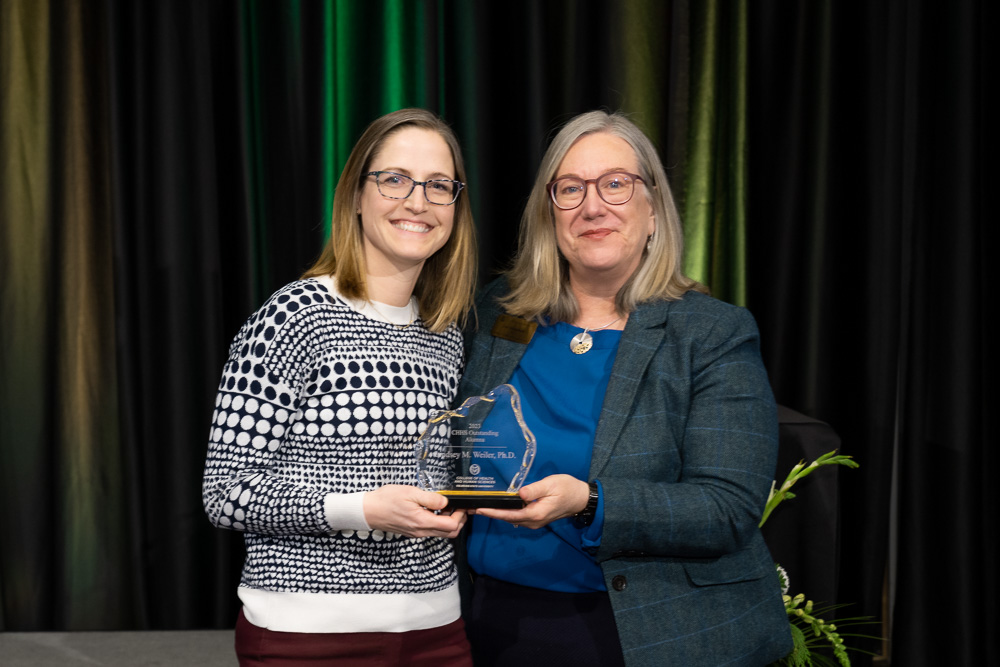
Lindsey Weiler (M.S., ’10; Ph.D., ’13) was Colorado State University’s first Ph.D. graduate in Applied Developmental Science from the Department of Human Development and Family Studies and has gone on to shape the field of youth mentoring, impacting community programs, families, and undergraduate and graduate students. Weiler was named a College of Health and Human Sciences Outstanding Alumna for her roles as co-developer of Campus Connections, CSU’s award-winning youth mentoring program; an associate professor in family social science at the University of Minnesota; researcher; and advocate for mental health.
Community-based learning
Weiler’s adolescence was formative. Growing up in rural Wisconsin, in her tiny school she was one of five students in her eighth-grade class, and students of multiple grades were combined. “I have vivid memories of older students teaching me math and of me helping younger ones learn to read,” she said. “This type of learning, as I understand now, can be incredibly powerful.”
“All throughout my childhood, I was surrounded by loving, selfless friends and family who understood the necessity and importance of caring for your neighbor,” she recalled.
Sometimes, the community support Weiler felt was in response to disaster. “When I was 17, my family experienced a house fire set by a neighbor. We lost my childhood home, but nearly immediately, our safety net and support network showed up with most of what we needed to survive the tragedy.”
Covert messages
In contrast to the overt compassion of this safety net, Weiler felt some confusing undercurrents. “Community and cultural norms related to hard work, self-mastery, and dismissal of emotions were highly present. Mental health issues were mostly stigmatized and not discussed at school. Emotionality was considered a weakness and sensitivity a flaw of the person.”
Weiler observed peers searching for outlets for their feelings, ranging from sports, music, and art to drug and alcohol use and suicide.
“Part of my motivation to pursue a career in youth mental health is to create communities and spaces for kids to be their authentic selves – emotions and all – and to be able to access mental health services at the exact time it’s needed, without shame,” she said.
First-generation success
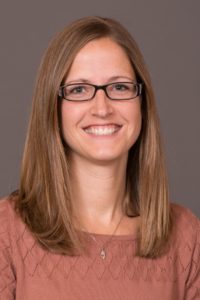
Weiler was the first in her family to earn a college degree, but she said, “Going to college always seemed attainable because of my parents’ commitment to education and community. Thankfully, I also found academic mentors along the way who were also first-generation students – people who understood the unsettling feeling of not knowing what you don’t know.”
“Both of my parents are lifelong learners who instilled in me a love of people and books,” she continued. “I feel proud and grateful to have been raised by them.”
She completed her bachelor’s degree at Concordia University, where she studied psychology with a professor who focused on family science. “It opened my eyes to systemic support,” Weiler said.
‘That’s it!’
During her early career, she was a residential counselor for youth who needed more help than they could get at home to manage their mental health issues and, in some cases, suicidality. She saw a marriage and family therapist working with the residents and families. “I thought, ‘That’s it! That’s what I want to do!’”
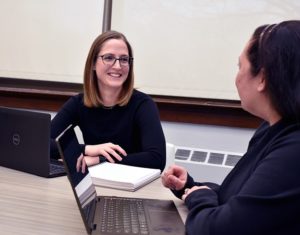 Weiler searched for a marriage and family therapy graduate program where she could work with adolescents and families. Inspired by the beautiful area and feminist-oriented faculty, she set her sights on CSU. She applied what she’d learned from mentors in her undergraduate career planning office who helped her envision graduate school – and how to make it affordable. “In-state tuition was a necessity,” she said.
Weiler searched for a marriage and family therapy graduate program where she could work with adolescents and families. Inspired by the beautiful area and feminist-oriented faculty, she set her sights on CSU. She applied what she’d learned from mentors in her undergraduate career planning office who helped her envision graduate school – and how to make it affordable. “In-state tuition was a necessity,” she said.
“I moved to Colorado and worked at a day treatment center in Denver and a domestic violence shelter for a year so I could establish residency,” she said.
A sense of identity
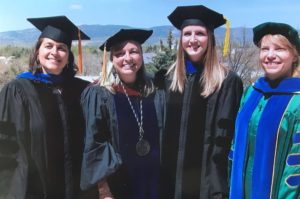
During her MFT Program, Weiler engaged with faculty mentors – and award nominators – Shelley Haddock, Jen Krafchick, and Toni Zimmerman. “Lindsey was a part of the genesis of Campus Connections,” Haddock explained. Campus Connections is an innovative mentorship program that pairs community youth with undergraduate students in mentorship families, all supervised by marriage and family therapy graduate students and faculty.
The Department of Human Development and Family Studies had been approached by local human services agencies who were looking to the university for best practices to support youth and adolescents and their families. “It fit perfectly with CSU’s land-grant mission and our department priorities to research mentorship while supporting our community’s needs and training mental health professionals,” Zimmerman said.
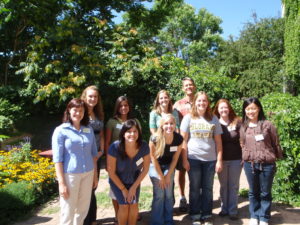
“I enjoyed the collaborative process of creating Campus Connections,” Weiler recalled. She thrived working with the college students who enrolled in the service-learning course and with the young people referred to the program from criminal justice, schools, social service agencies, and health care providers. She managed the intake process with families and helped pair the youth with CSU students. “I felt very connected to all levels of the program,” she said. “I found a sense of identity.”
Weiler also appreciated the cohort of students in the MFT Program. “We went to class and learned how to be therapists together. These are such vulnerable things to do,” she reminisced. With these friends and classmates, Weiler took advantage of life in Colorado, visiting Estes Park, and enjoying Old Town Fort Collins. “I love outdoor activities – hiking, running, camping.” She also tried intramural basketball, which she found “fun and humbling.”
Academic aspirations
“I still imagined myself as a therapist,” she said, as she looked beyond her master’s degree. At the time, the Department of Human Development and Family Studies was accepting its first applicants to a new Ph.D. program in Applied Developmental Science, and her mentors encouraged her to apply. “It was perfect timing to continue the work developing Campus Connections, and a natural next step,” she remembered.
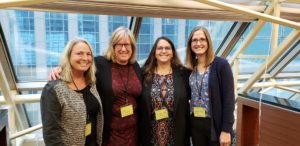
As she began her doctoral studies, and Campus Connections grew and solidified as a program, Weiler had the opportunity to step back from the day-to-day experiences and evaluate the program design and efficacy. She reviewed data and published journal articles with her collaborators.
“I began to imagine a career in research and academia,” she said. In addition to her clinical work in the MFT program, Weiler gained experience teaching adolescent development and research methods classes. “I had a lot of independence as the first Ph.D. student,” in applied developmental science, she said. “All of these experiences at CSU helped me feel confident.”
Wrapping up her Ph.D., Weiler sought additional mentors who would help expand her repertoire. “I spent one year as a post-doc with Heather Taussig at the University of Colorado School of Medicine,” she explained. There, she gained experience in randomized controlled trials and secondary data analysis, which bolstered her application for a tenure-track faculty position at the University of Minnesota. She was appointed assistant professor in 2014 – just one year after completing her Ph.D. – and received tenure in 2020.
Continued connections
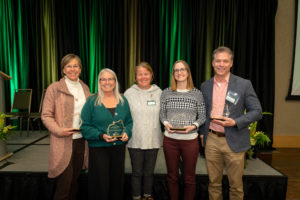
Haddock, Krafchick, and Zimmerman continue to lead Campus Connections with Mackenzie Miller. The team greatly values the continued collaboration with Weiler in researching the impact of the program and efforts to secure grant funding. Together, they explore factors to improve outcomes for youth who’ve experienced adversity and/or trauma and strategies to prevent substance abuse. Weiler has published an impressive 38 articles in refereed journals, co-authored four book chapters, and made dozens of presentations. Her collaborators have expanded to include the students she now mentors; in the past eight years, she has supported more than 40 undergraduate students and more than 35 graduate students in her research lab.
The success of Campus Connections goes far beyond Weiler’s research publications. The program has been licensed and replicated on four other university campuses to date and continues to yield improved participant mental health and behavior outcomes, along with data to support the model.
Accolades and leadership
“Dr. Weiler has made significant and sustained contributions to the local communities in which she has lived, her universities, the nation, and the world,” Haddock cited in Weiler’s nomination. In recognition of her expertise and the impact of her work, Weiler was selected as the 2018 Rising Star by the Women’s Philanthropic Leadership Circle. Since 2015, she has served on the peer-nominated Research Board of the National Mentoring Resource Center and since 2019 on the Board of Directors with MENTOR Minnesota. She was selected for the President’s Initiative for Student Mental Health task force at the University of Minnesota and its College Hub to Aspire, Inspire, and Reinvent leadership program. Weiler currently serves on the Mental Health Advisory Council for her local school district and on the editorial boards for Journal of Youth and Adolescence and Journal of Marital and Family Therapy, while maintaining licensure as a marriage and family therapist in Minnesota and Wisconsin and an approved supervisor for the American Association for Marriage and Family Therapy.
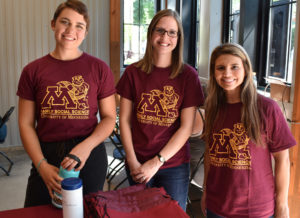
Weiler continues to evaluate and support youth mentoring work in a variety of ways. “There are many youth mentoring programs in Minnesota. The state has a rich history of youth development programming,” Weiler explained. And yet there are regions with limited support for children and adolescents. In an effort to fill service gaps resulting from the nationwide mental health provider shortage, Weiler is currently co-leading a study to expand access to evidence-based, mental health programs in rural areas by training youth mentors to deliver interventions typically delivered by mental health care providers. “Where my heart is right now is getting services where services aren’t,” she said.
‘They believed in me’
“Lindsey is a person who consistently demonstrates high levels of integrity, commitment to students, passion for youth, and an incredible devotion to making a difference in her local community, nationally, and globally,” Krafchick said. “She is very deserving of this award.”
Each step of the way Weiler had an example of someone who had conquered a challenge or achieved a goal she was ready to tackle. “They believed in me beyond belief,” Weiler said of her own mentors. “They were – and still are –the best role models and supporters I could imagine.”
Read about all College of Health and Human Sciences 2022-2023 award recipients.
Campus Connections is in the Department of Human Development and Family Studies, part of CSU’s College of Health and Human Sciences.